How Phil Davis and Greater Western Sydney matured from newbie to contender
IT is the Giants’ eighth season in the AFL and under co-captains Callan Ward and former Crow Phil Davis the club has reached another level of maturity.
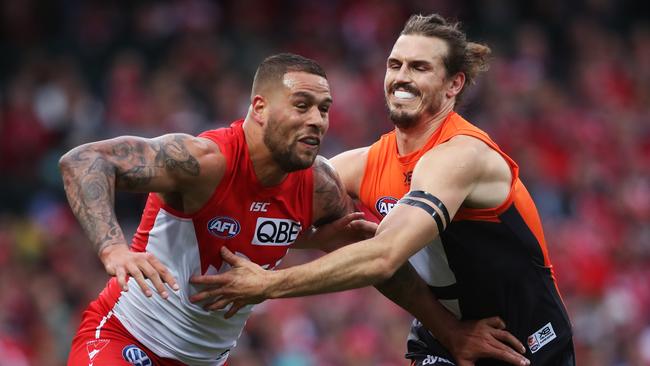
Sport
Don't miss out on the headlines from Sport. Followed categories will be added to My News.
IT WAS the match within the match which not only summed up how far Phil Davis and GWS have come but also confirmed his title as Buddy slayer.
Davis, the Giants co-captain, was standing All-Australian captain Lance “Buddy” Franklin, the most prolific goal kicker among the current players, and the contest had been central in the build-up to the Battle-of-the-Bridge final.
Davis kept Franklin goalless in a man-of-the-match contribution; GWS beat the Swans comfortably to move into this weekend’s semi-final against Collingwood.
The effort of Davis underlined not only how far he has come as a leader and a player, but also how he has helped the Giants develop their own culture and inner strength.
Davis, as is his way, played down his efforts afterwards.
“It (the build-up) was bigger than it’s ever been,” Davis told the club’s web site this week. “Usually it starts Wednesday, Thursday, Friday — this started a week out.
“Which is fine by me; it doesn't faze me.
“People think it adds pressure but I know for myself how important playing on a bloke of Franklin’s ability is.
“So it’s not as if it’s telling me something new; it’s just a consistent reminder.
“You understand the pressure that comes with it but at the end of the day it was merely a reflection of my teammates in all different positions.
“Whether it was the mids or the forwards putting great pressure on the ball or my backs helping me out by coming across and assisting and taking out space — all the things that are so important my teammates did.
“I merely had to do a little bit of work.
“It’s a bit embarrassing at times when you realise that it really wasn’t all up to you.
“And Lance was a bit sore … we’re all a bit sore at this time of year but he was obviously a bit sorer than normal.
“I don’t think I deserved all the praise.”
But Alan McConnell, the Giants’ director of coaching and the club’s first employee, said Davis had been pivotal not just this season — arguably his best — but also in the growth of the club.
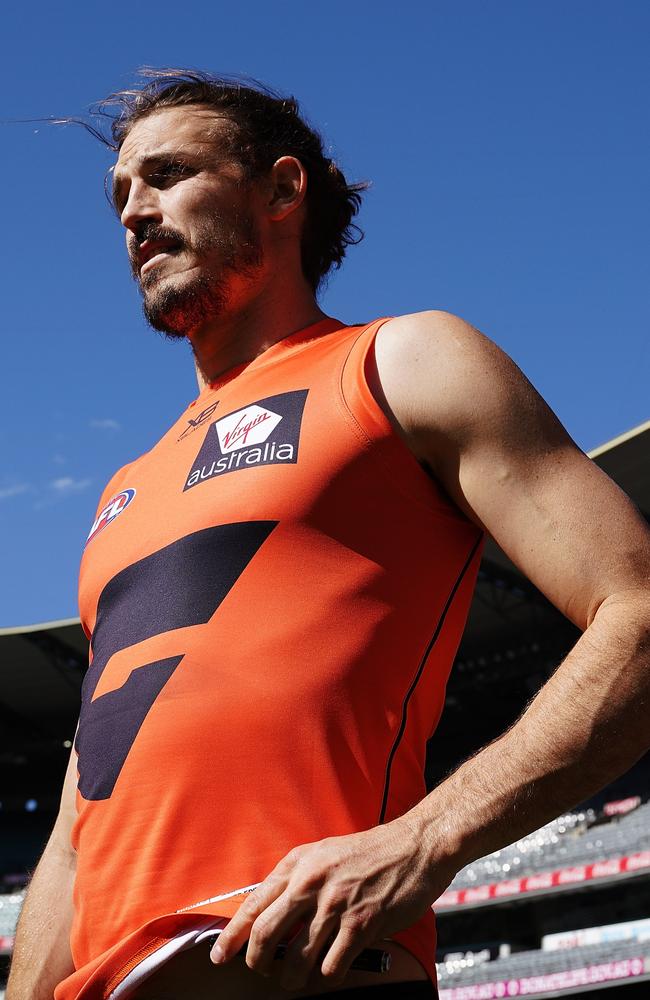
His and Callan Ward’s leadership has been refined but its greatest strength has been how they had taken ownership of the culture of the club.
“He (Phil) has changed over the years,” McConnell said. “He had a poor run with injuries so on one level was a mature kid with a good head on his shoulders but at the same time he was trying to establish himself as a bona fide player.
“Like everybody he needed the ability to wear a mask, to put the perception out there that the world’s your oyster and everything’s fine.
“But the maturity that he and Callen had was significant but they weren’t without their challenges.
“He’s pretty black and white, Phil, but I think he’s probably become more accepting, has realised that one size doesn’t fit all and developed the capacity to see that there are multiple ways to achieve the same outcome.
“The other thing is that as he’s become more comfortable and more settled in his game role it’s allowed him to take greater ownership.
“I think our leadership group, particularly in the last 12 months, have made it their culture — not the club’s culture.
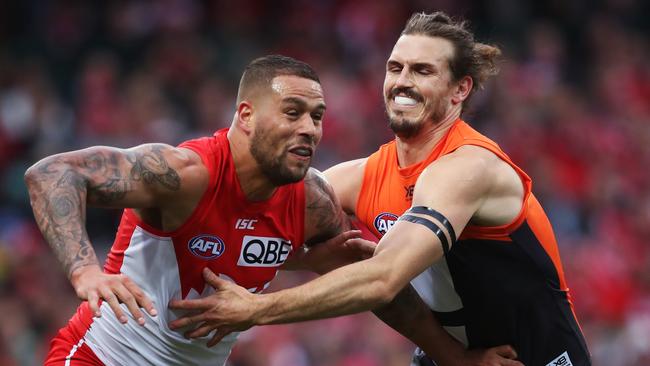
“He’s had a very good year.”
Davis’ had been earmarked for the role of club leader a long way out.
When he was first poached from Adelaide for a once-in-a-lifetime opportunity nobody was surprised.
He had already measured up against some of the best forwards in the game but it was also about his leadership: he had been a school prefect, first XI cricketer and football team captain at Adelaide’s prestigious St Peter’s College.
The Crows only premiership captain, Mark Bickley, was an assistant coach at Adelaide during Davis’ early years and had already noted a point of difference with Davis.
One incident that stood out was a sickening clash between Davis and Fremantle giant Aaron Sandilands back in 2010.
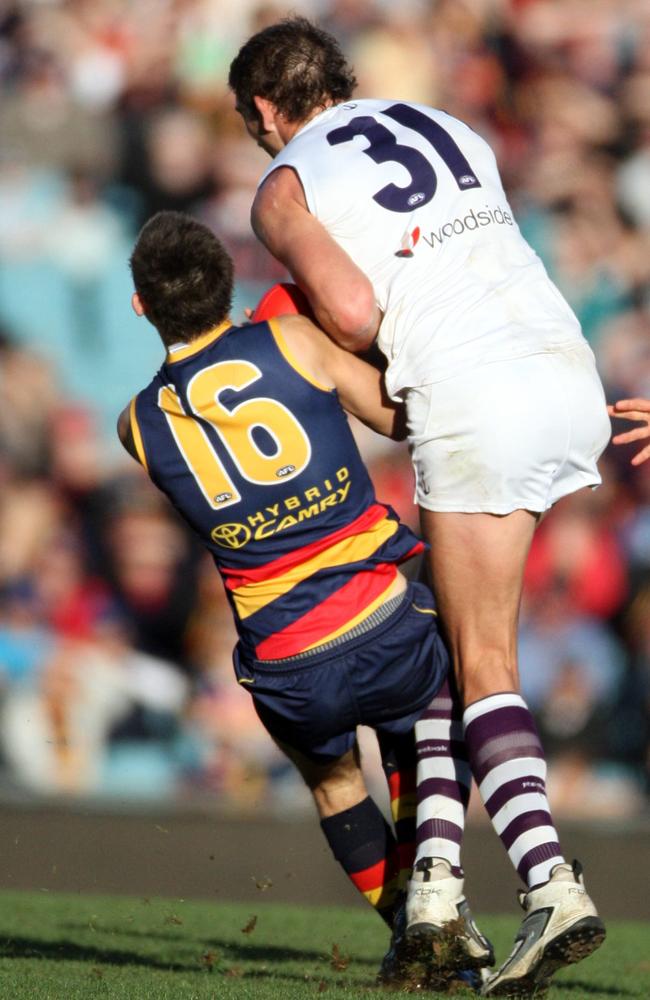
Davis had run with the flight of the ball only to leave the ground concussed on a stretcher after colliding with the 211cm, 118kg Sandilands, the biggest man in the game.
To Bickley, it confirmed the courage of Davis.
“I know that one of the reasons they recruited him was because of his leadership potential and that was very evident early on,” Bickley said. “There was one moment when he went back with the flight of the ball and got knocked out by Aaron Sandilands going the other way and I think that impressed on everybody at the club, including me, that he was made of the right stuff.
“You never know how players are going to develop.
“He was thrust into that leadership role very early on … sometimes players can rise to the challenge and I think he and Callen Ward has been unbelievable.
“There have been other cases like Melbourne, when they elevated Jack Trengove and Jack Grimes, where maybe they went a bit early.
“But Phil and Callan they’ve been able to nurture and guide them and they’ve both turned out to be exceptional.”
Just as Davis, 28, is in the prime of his career GWS have found a stability that still years away for the other late franchise, the Gold Coast.
McConnell put it down to some of the club’s early decisions, which included hiring AFL legend Kevin Sheedy as the inaugural coach and signing veteran players on the promise of helping them get a start in coaching.
“The first thing is you have to be comfortable with change,” McConnell said. “You have to understand that what you did yesterday is not what you’ll do tomorrow or what you’re going to experience tomorrow.
“It’s probably worked well with a young group because they don’t have any expectations of what the world should look like.
“And a large number of uncontracted players who came onto our list, like Phil and Callen, were still relatively new to the game.
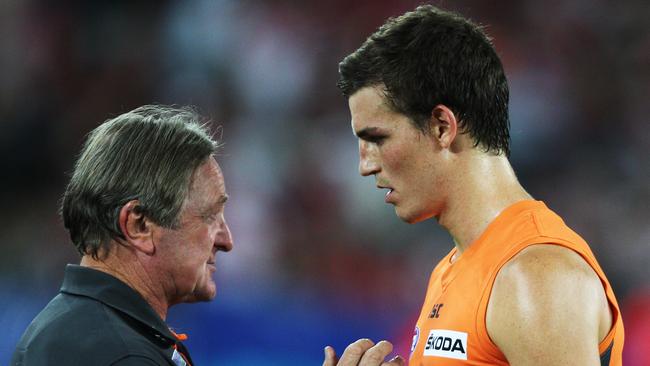
“So while they were both coming from strong clubs they were still finding their way.
“The other thing that worked exceptionally well for us was that if you look at (Chad) Cornes, (Dean) Brogan, James McDonald, Luke Power … those guys came to our club and played in their first year — Brogan for two years — on contracts that had coaching the year after.
“So unlike the Gold Coast, where all of the uncontracted players played for their next contract, our mature-age guy where there for a long-term outcome, not their own personal next contract.
“It was about the build of the club. They were more connected to the bigger picture.
“And Sheeds … the way we put the list together we were always going to do some hard yards.
“Sheeds didn’t need to win games to be a legend of the game or retain his status. He was building whether we won or lost, with a young coach that may not necessarily have been the case.”
McConnell has noted a subtle shift in how GWS is perceived in Sydney.
It’s still not the city’s equivalent of Collingwood — or even the Swans — but since it has made the finals its reputation and fan base has been on a steady build.
“People are asking questions of you and about the players,” McConnell said. “Before we played finals no one could have cared less.
“It’s a slow burn. The AFL always said this was going to be a generational investment and that's what it’s like.
“We have 25,000 members who people outside Sydney say, “so what?” but the reality is that that puts up right up there in Sydney in terms of membership bases for sporting clubs.
“When we have family days now kids don’t turn up in NRL jumpers or other clubs’ jumpers — they turn up in our jumpers.”
Originally published as How Phil Davis and Greater Western Sydney matured from newbie to contender
